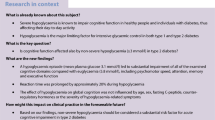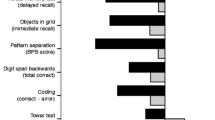Abstract
It has been suggested that cerebral adaptation may occur in response to short-term hypoglycemia. This was examined in the present study by measuring serial changes in cognitive function and symptoms after 60 min of continuous hypoglycemia. Hypoglycemia was induced with a hyperinsulinemic glucose clamp on two separate occasions in 24 non-diabetic human subjects. Cognitive function was assessed using the following cognitive test battery: Paced Auditory Serial Addition Test (PASAT), Rapid Visual Information Processing (RVIP), Trail-Making B (TMB), Digit Symbol Substitution Test (DSST) and Four Choice Reaction Time (CRT). In condition A the blood glucose was maintained at 4.5 mmol/l throughout. On two separate occasions (condition B and condition C) the blood glucose was stabilised at 4.5 mmol/l for 30 min, lowered to 2.5 mmol/l for 60 min and restored to 4.5 mmol/l for 30 min. In each condition the cognitive test battery was performed immediately after stabilisation of blood glucose at 4.5 mmol/l and the subsequent battery was repeated at different time intervals: condition A — after a further 40 min of euglycemia; condition B — after 5 min of hypoglycemia; condition C — after 40 min of hypoglycemia. Acute hypoglycemia induced a significant deterioration in cognitive function which was manifest in all tests except TMB (P<0.05), but performance ability did not differ between conditions B and C. Symptom scores, assessed by a scaled questionnaire, increased significantly during hypoglycemia (P<0.001) but no differences were detected between the scores at 30 min and 60 min. In non-diabetic humans, no improvement appears to occur either in cognitive function or in symptom score after 40–60 min of hypoglycemia (2.5 mmol/l), suggesting that cerebral adaptation does not occur during this period of time.
Similar content being viewed by others
References
Amiel SA, Pottinger RC, Archibald HR, Chusney G, Cunnah DTF, Prior PF, Gale EAM (1991) Effect of antecedent glucose control on cerebral function during hypoglycemia. Diabetes Care 14:109–118
Bendtson I, Gade J, Theilgaard A, Binder C (1992) Cognitive function in Type 1 (insulin-dependent) diabetic patients after nocturnal hypoglycaemia. Diabetologia 35:898–903
Blackman JD, Towle VL, Sturis J, Lewis GF, Spire J-P, Polonsky KS (1992) Hypoglycemic thresholds for cognitive dysfunction in IDDM. Diabetes 41:392–399
Boyle PJ, Nagy EJ, O'Connor AM, Kempers SF, Yeo RA, Qualls C (1994) Adaptation in brain glucose uptake following recurrent hypoglycemia. Proc Natl Acad Sci USA 91:9352–9356
Cox D, Gonder-Frederick L, Driesen N, Clarke W (1993) Driving decrements in type 1 diabetes during moderate hypoglycemia. Diabetes 42:239–243
Cremer JE, Cunningham VJ, Seville MP (1983) Relationships between extraction and metabolism of glucose, blood flow and tissue blood volume in regions of rat brain. J Cereb Blood Flow Metab 3:291–302
Deary IJ (1993) Effects of hypoglycaemia on cognitive function. In: Frier BM, Fisher BM (eds) Hypoglycaemia and diabetes. Clinical and physiological aspects. Edward Arnold, London, pp 80–92
Deary IJ, Langan SJ, Hepburn DA, Frier BM (1991) Which abilities does the PASAT test? Person Indiv Diff 12:983–987
Deary IJ, Langan SJ, Graham KS, Hepburn DA, Frier BM (1992) Recurrent severe hypoglycemia, intelligence and speed of information processing. Intelligence 16:337–359
DeFronzo RA, Tobin JD, Andres R (1979) Glucose clamp technique: a method for quantifying insulin secretion and resistance. Am J Physiol 237:E214–223
Eckert B, Rosen I, Stenberg G, Agardh C-D (1992) The recovery of brain function after hypoglycaemia in normal man. Diabetologia 35:A43 (abstract)
Frankenhaeuser M (1971) Behavior and circulating catecholamines. Brain Res 31:241–262
Hepburn DA, Deary IJ, Frier BM, Patrick AW, Quinn JD, Fisher BM (1991) Symptoms of acute hypoglycemia in humans with and without IDDM. Factor-analysis approach. Diabetes Care 14:949–957
Herold KC, Polonsky KS, Cohen RM, Levy J, Douglas F (1985) Variable deterioration in cortical function during insulin-induced hypoglycemia. Diabetes 34:677–685
Hick WE (1952) On the rate of gain of information. Q J Exp Psychol 4:11–26
Hoffman RG, Speelman DJ, Hinnen DA, Conley KL, Guthrie RA, Knapp RK (1989) Changes in cortical functioning with acute hypoglycemia and hyperglycemia in Type 1 diabetes. Diabetes Care 12:193–197
Holmes CS, Hayford JT, Gonzalez JL, Weydert JA (1983) A survey of cognitive functioning at different glucose levels in diabetic persons. Diabetes Care 6:180–185
Jones TW, McCarthy G, Tamborlane WV, Roessler E, Sherwin RS (1991) Resistance to neuroglycopenia: an adaptive response during intensive insulin treatment of diabetes. Diabetes 40:557A (abstract)
Kerr D, Macdonald IA, Tattersall RB (1989) Adaptation to mild hypoglyaemia in normal subjects despite sustained increases in counter-regulatory hormones. Diabetologia 32:249–254
Kerr D, Macdonald IA, Tattersall, RB (1991a) Patients with type 1 diabetes adapt acutely to sustained mild hypoglycaemia. Diabet Med 8:123–128
Kerr D, Reza M, Smith N, Leatherdale BA (1991b) Importance of insulin in subjective, cognitive, and hormonal responses to hypoglycemia in patients with IDDM. Diabetes 40:1057–1062
McCall AL, Fixman LB, Fleming N, Tornheim K, Chick W, Ruderman NB (1986) Chronic hypoglycemia increases brain glucose transport Am J Physiol 251:E442–447
Pelligrino DA, Segil LJ, Albrecht RF (1990) Brain glucose utilization and transport and cortical function in chronic vs acute hypoglycemia. Am J Physiol 259:E729–735
Pramming S, Thorsteinsson B, Theilgaard A, Pinner EM, Binder C (1986) Cognitive function during hypoglycaemia in type 1 diabetes mellitus. BMJ 292:647–650
Reitan RM, Davison LA (1974) Clinical neuropsychology: current status and applications. Hemisphere, New York
Richardson JTE (1990) Cognitive function in diabetes mellitus. Neurosci Biobehav Rev 14:385–388
Ryan CM, Atchison J, Puczynski S, Puczynski M, Arslanian S, Becker D (1990) Mild hypoglycemia associated with deterioration of mental efficiency in children with insulin-dependent diabetes mellitus. J Pediatr 117:32–38
Stevens AB, McKane WR, Bell PM, Bell P, King DJ, Hayes JR (1989) Psychomotor performance and counterregulatory responses during mild hypoglycemia in healthy volunteers. Diabetes Care 12:12–17
Wechsler D (1981) Manual for the Wechsler Adult Inteligence Scale - revised. Psychological Corporation, New York
Widom B, Simonson DC (1990) Glycemic control and neuropsychologic function during hypoglycemia in patients with insulin-dependent diabetes mellitus. Ann Int Med 112:904–912
Ziegler D, Hubinger A, Mühlen H, Gries FA (1992) Effects of previous glycaemic control on the onset and magnitude of cognitive dysfunction during hypoglycemia in Type 1 (insulin-dependent) diabetic patients. Diabetologia 35:828–834
Author information
Authors and Affiliations
Rights and permissions
About this article
Cite this article
Gold, A.E., MacLeod, K.M., Thomson, K.J. et al. Cognitive function during insulin-induced hypoglycemia in humans: Short-term cerebral adaptation does not occur. Psychopharmacology 119, 325–333 (1995). https://doi.org/10.1007/BF02246299
Received:
Revised:
Issue Date:
DOI: https://doi.org/10.1007/BF02246299




